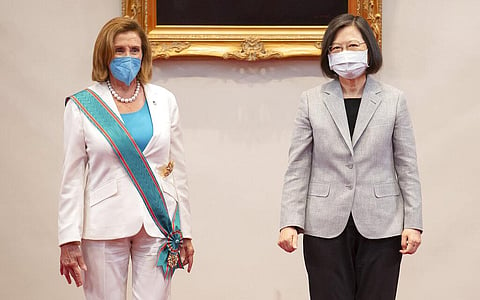

BEIJING: China's foreign ministry announced sanctions against US House Speaker Nancy Pelosi on Friday, after her visit to Taiwan this week prompted fury and shows of military force from Beijing.
The ministry said Pelosi was "seriously interfering in China's internal affairs and seriously undermining China's sovereignty and territorial integrity" with the visit, and that Beijing would "impose sanctions on Pelosi and her immediate family", without giving further details. Such sanctions are generally mostly symbolic in nature.
China on Friday said it is cancelling or suspending dialogue with the United States on a range of issues from climate change to military relations and anti-drug efforts in retaliation for a visit this week to Taiwan by U.S. House Speaker Nancy Pelosi.
China also announced that more than 100 warplanes and 10 warships have taken part in live-fire military drills surrounding Taiwan over the past two days.
The official Xinhua News Agency said Friday that fighters, bombers, destroyers and frigates were all used in what it called “joint blockage operations” taking place in six zones off the coast of Taiwan, which China claims as its own territory.
The military’s Eastern Theater Command also fired new versions of missiles it said hit unidentified targets in the Taiwan Strait “with precision.”
Those included projectiles fired over Taiwan into the Pacific, military officers told state media, in a major ratcheting up of China’s threats to annex the island by force.
China has announced sanctions on a number of US officials in recent years for acting against what it views as its core interests and speaking out on human rights issues in Hong Kong and the northwestern region of Xinjiang, often without specifying punitive measures.
In March this year, Beijing said it was imposing visa restrictions on an undisclosed list of United States officials who had allegedly "concocted lies on human rights issues involving China".
Former US secretary of state Mike Pompeo, as well as Peter Navarro -- a trade adviser to former president Donald Trump -- were among those hit by earlier waves of sanctions and are forbidden from entering China as well as doing business with Chinese entities.
Beijing's ruling Communist Party views self-ruled, democratic Taiwan as part of its territory and has vowed to one day take it, by force if necessary.
Nancy Pelosi said Friday that China will not isolate Taiwan by preventing US officials from travelling there. She made the remarks in Tokyo on the final leg of an Asia tour highlighted by a visit to Taiwan that infuriated China.
The Chinese have tried to isolate Taiwan, Pelosi said, including most recently by preventing it from joining the World Health Organisation. "They may try to keep Taiwan from visiting or participating in other places, but they will not isolate Taiwan by preventing us to travel there," she said.
Pelosi said her trip to Taiwan was not intended to change the status quo for the island but to maintain peace in the Taiwan Strait.
Pelosi, the first House speaker to visit Taiwan in 25 years, said Wednesday in Taipei that the US commitment to democracy in the self-governing island and elsewhere "remains ironclad".
China, which claims Taiwan and has threatened to annex it by force if necessary, called her visit to the island a provocation and on Thursday began military drills, including missile strike training, in six zones surrounding Taiwan, in what could be its biggest since the mid-1990s.
China's insistence that Taiwan is its territory and threat to use force to bring it under its control has featured highly in ruling Communist Party propaganda, the education system and the entirely state-controlled media for the more than seven decades since the sides divided amid civil war in 1949.
Island residents overwhelmingly favor maintaining the status quo of de facto independence and reject China's demands that Taiwan unify with the mainland under Communist control.
On Friday morning, China sent military ships and war planes across the mid-line of the Taiwan Strait, the Taiwanese Defense Ministry said, crossing what had for decades been an unofficial buffer zone between China and Taiwan.
Japanese Defence Minister Nobuo Kishi said five missiles landed on Thursday in Japan's exclusive economic zone off Hateruma, an island far south of Japan's main islands.
He said Japan protested to China, saying the missiles "threatened Japan's national security and the lives of the Japanese people, which we strongly condemn".
WATCH HERE:
(With inputs from AFP, AP, PTI)